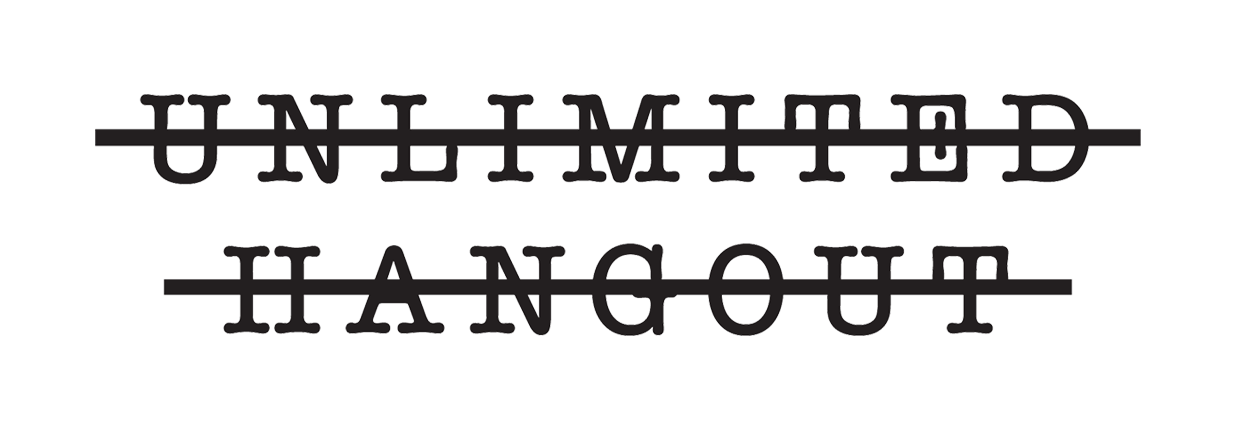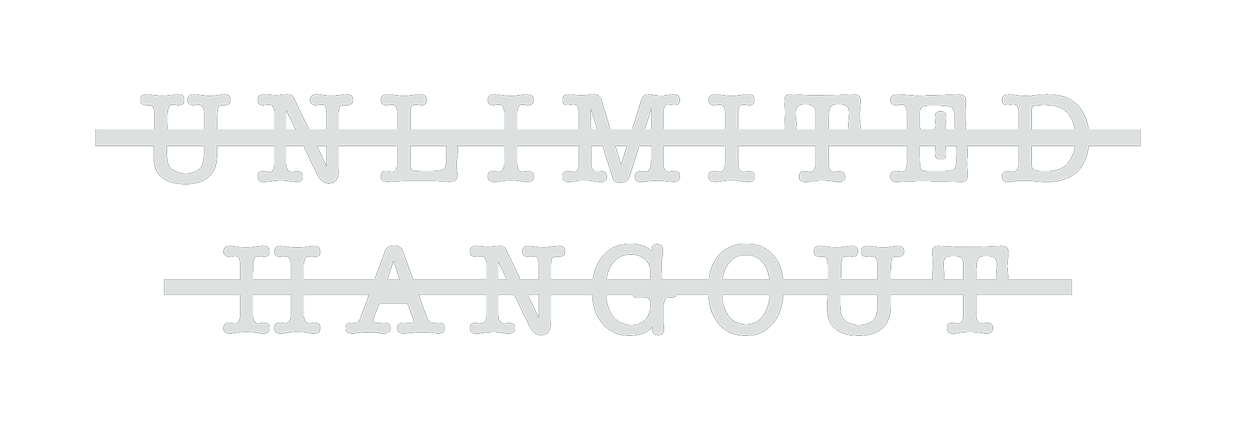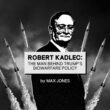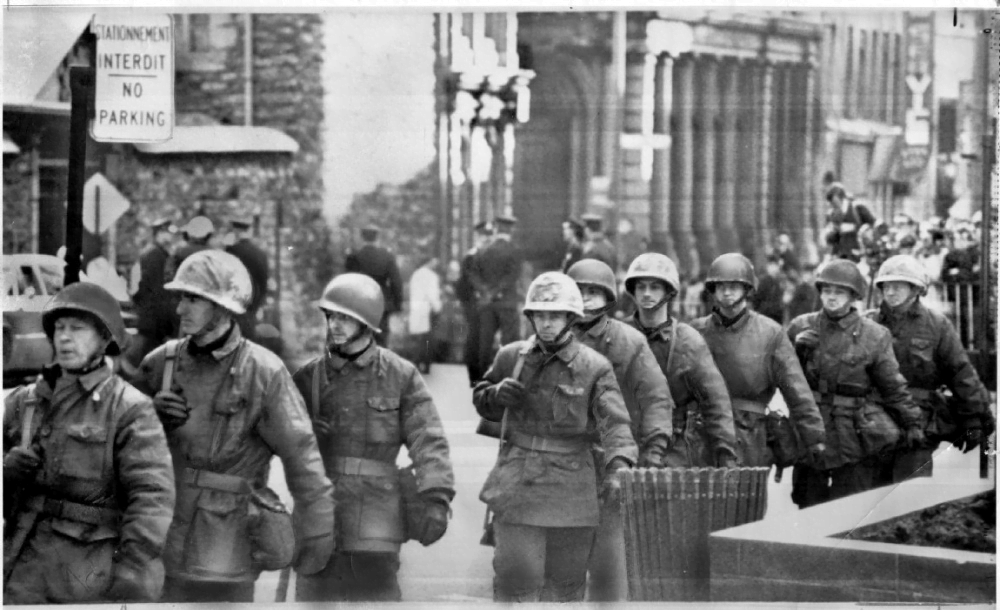Due to the current activation of the Emergency Measures Act by Canadian Prime Minister Justin Trudeau on February 14 in response to the Freedom Convoys and blockades both in Ottawa and across various provinces of Canada, I thought it fitting to revisit research that I had previously published as a series co-written with Paris-based journalist Benoit Chalifoux that explores the previous, controversial invocation of that same act by Justin’s father, Pierre Trudeau, in 1970.
First, I will detail some important contextual information of the Martial Law and War Measures Act deployed by Pierre Trudeau, who utilized a demonstrably staged crisis run by Anglo-Canadian intelligence networks between 1960-1970, eventually resulting in tanks rolling across the streets of Quebec and opponents to an anti-human reform of society being crushed. This section will also deal with some important contextual matters dealing with the directing role of the eugenics-driven Fabian Society and its Canadian branches in this manufactured crisis, using it to shape a technocratic revolution in 1970. Next, I will break down the facts of the October Crisis, dismantling the official narrative of «lone cells of violence-prone separatists» and producing clear evidence that the entire operation was an inside job directed by top down agencies Anglo-Canadian intelligence.
Revisiting the October crisis of 1970 is important given recent events as they relate to the Canadian Freedom Convoys and related manifestations. There are unsettling similarities between what transpired in 1970 and what is happening now, with the staging of Confederate and Nazi flags within the currently ongoing Ottawa protest movement, which has been used to exacerbate the State’s narrative that these peaceful protesters are “violent racist insurrectionists” that must be stopped at all costs and the February 14 warning delivered by the former head of Trudeau’s security detail of an imminent false flag in Ottawa that would be sparked by firearms planted in or around the Freedom Convoy. This exercise will not only help us gain a better understanding of the nature of the game at play, but also the weaknesses of the «deep state» apparatus long embedded within the heart of Canada’s political and intelligence establishments.
Sovereignty or Technocracy: A Tale of Two Revolutions
Until 1947, Canada was known as “The Dominion of Canada”. While title of “Dominion” has changed, Canada is technically still not an independent nation, but a Monarchy ruled by the British Queen and Privy Council. Until the 1960s, the French Canadians, who form the overwhelming majority of the population of Quebec, primarily worked as manual labourers and in low-level clerical jobs, while the upper echelons of society were occupied by the descendants of the British colonial elite. The question for honest leaders in Quebec at that time was “How can a society so long kept economically and culturally underdeveloped be brought into a state of self-government, skills and dignity?»
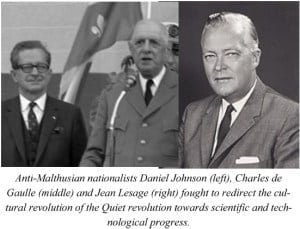
Faced with that conundrum, Quebec Premiers Paul Sauvé (1959), Jean Lesage (Liberal Party 1960-65) and Daniel Johnson Sr. (Union Nationale 1966-68) had, between 1959 and 1968, instituted policies that had led to a great economic revolution in Quebec centered on scientific and technological progress. Through their efforts, an advanced engineering culture arose in Quebec, as did an orientation towards ending colonialism under French President Charles de Gaulle’s leadership.
This was, however, only one current that shaped the 1959-68 period of Quebec. There was a second, much more insidious current that also shaped the events of that period. Without an understanding of both currents, it is impossible to comprehend the true purpose of the October crisis of 1970 and its effects.
The Deconstruction and Reconstruction of Society: The Role of the Fabian Society
The de Gaulle-Johnson-Lesage nation-building momentum had been an inspired attempt to outflank the influence of the British Malthusian movement, which had worked to permeate many branches of government during the first half of the 20th century. This Malthusian movement, directed from the London-centered global intelligence apparatus, had been attempting to impose a program in Canada and elsewhere that Fabian Society leader H.G. Wells described in detail in his 1940 book “New World Order.” Put simply, this program was essentially a transformation away from the nation-state model and towards a new model of social organization based on depopulation, eugenics and one world government.
The Fabian Society was established in 1884 by a coterie of British eugenicists and Malthusians in order to promote a new social order designed to mold society into a new, mechanized order run by a managerial elite of “social scientists” from the top down.
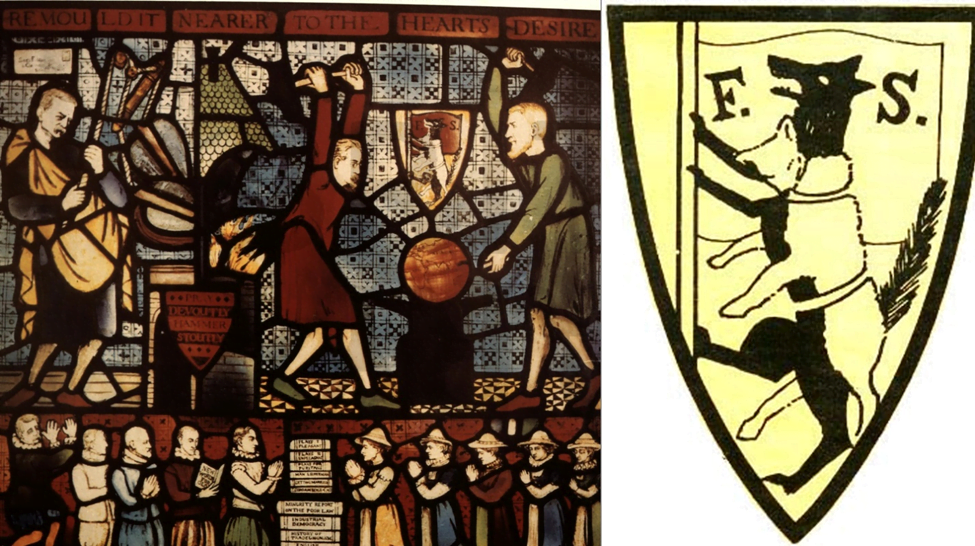
The choice of the title “Fabian” was derived from the Roman general Quintus Fabius Maximus Verrucosus who was renowned for his strategy of defeating his enemies through superhuman patience and slow attrition. The Fabian philosophy was displayed in an infamous stained-glass piece of art featuring Fabian leaders George B. Shaw and Sidney Webb as blacksmiths hammering the world into their own secular image and featuring a shield of the Fabian logo of a wolf in sheep’s clothing.
Unlike the conventional “brute force” approach of conservative British imperialists, who often opted for scorched earth methods of destroying their victims, the Fabians prided themselves on playing a more “peaceful”, yet subtle and deadly long game. Rather than push for big wars, which often had the effect of risking heavy losses on the oligarchy itself, the Fabians understood that it was better to promote slow attrition and infiltration using Jesuitical techniques of permeation.
Historian Stephen O’Neil wrote the following of the Fabian Society’s guiding principle of Permeation theory:
“Despite their traditional political image, the Fabians, under the impetus of Sidney Webb, thought that they had a new and unique weapon in the policy of permeation. It was through the utilization of this tactic, according to Webb, that the Fabians, in the spirit of the Trojans and their legendary horse, would enter the ranks and minds of the politically influential by providing them with programs, ideas, opinion, and research heavily documented with statistics which could be conveniently drafted into public policy.”
Throughout the 20th century, the Fabian Society would penetrate branches of government, military, academia, media and private corporate boards around the world. From below, plebs and laborers would be attracted by “buzz words” promoted by Fabians, like equality, social justice, and re-distribution of wealth that were ultimately hollow as these powerful networks had no intention of manifesting what those words actually mean.
Like Jesuitical and Masonic orders, many Fabians would never have a clue what those at the top of their organizations intended for society on a global scale. This is why the British Labor Party (formerly the Fabian Party of Britain) has so often attracted well-intended members who never had a clue what the game was truly about. The official Fabian School that became an ideological control hub and recruiting grounds for next generation talent (paralleling the Rhodes/Milner Round Table’s Oxford University) was the London School of Economics.

George Bernard Shaw outlined the pro-eugenics Fabian philosophy clearly in 1934 when he said:
“The moment we face it frankly we are driven to the conclusion that the community has a right to put a price on the right to live in it … If people are fit to live, let them live under decent human conditions. If they are not fit to live, kill them in a decent human way. Is it any wonder that some of us are driven to prescribe the lethal chamber as the solution for the hard cases which are at present made the excuse for dragging all the other cases down to their level, and the only solution that will create a sense of full social responsibility in modern populations?”
H.G. Wells was equally explicit in many of his non-fiction writings, saying in 1904: “The way of nature has always been to slay the hindmost, and there is still no other way, unless we can prevent those who would become the hindmost being born. It is in the sterilization of failure, and not in the selection of successes for breeding, that the possibility of an improvement of the human stock lies.”
In his work Open Conspiracy (1928), H.G. Wells targeted the institution of the sovereign nation state itself, which had to be purged in favour of a new structure of global governance:
“It is the system of nationalist individualism that has to go… We are living in the end of the sovereign states… In the great struggle to evoke a westernized World Socialism, contemporary governments may vanish…. Countless people… will hate the new world order….and will die protesting against it.”
Later on, in 1932, Wells, ever the devout eugenicist, stated that all progressives and social reformers must become “liberal fascisti… enlightened Nazis.”
The Fabian Society of Canada
As Wells spoke those words in 1932, The Fabian Society of Canada was constituted under the title of “The League of Social Reconstruction”, with the aim of solving the problems of the Great Depression with a scientifically-managed socialist order.
It is noteworthy that of the eight founders of this organization, six were Oxford Rhodes Scholars (F.R. Scott, Eugene Forsey, King Gordon, Escott Reid, David Lewis and Graham Spry), and two were Fabians (Frank Underhill and Leonard Marsh). The purpose of the LSR and its political party, the Cooperative Commonwealth Federation (CCF), was to implement scientific authoritarianism under the model set forth by H.G. Wells as a “solution” to the Great Depression. It should thus not come as a surprise that the first CCF leader, J.S. Woodsworth, was a leading advocate of eugenics.
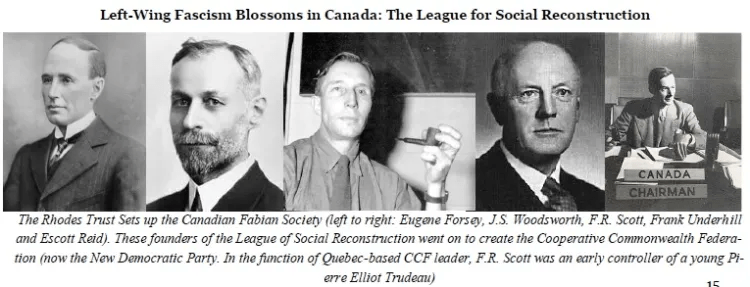
F.R. Scott became a leading recruiter and lifelong handler of Pierre Trudeau, former Prime Minister of Canada and Justin Trudeau’s father, upon the latters’ return to Canada in 1950. This was several years after Trudeau had trained under the tutelage first of Rhodes Scholar William Yandall Elliot at Harvard and then of Fabian Society figure Harold Laski at the London School of Economics. The LSR, CCF leadership worked closely with the Canadian Institute for International Affairs (aka: Canada’s Chatham House) and later changed its name to the National Democratic Party (NDP) in 1960.
The Importance of De-Christianizing Society
The intention of the synarchist figures who ran both the October Crisis and the secularization of Quebec aimed at nothing short of bringing society under a system of perfect predictability and control under a scientifically managed world government.
For this deconstruction of pre-existing values to occur, H.G. Wells and other Fabian thinkers reasoned that society would have to be purged of its traditional Judeo-Christian values, love for the general welfare, and especially scientific and technological progress. In this sense, all forms of individualism that Wells refers to are simply causes of uncertainty and uncontrollable change in the mind of a social engineer and hence must be purged. According to Wells, only a materialist society motivated by selfish impulses under a system of fixed resources can be controlled in a predetermined fashion. Quebec, during this period was a battleground for the soul of Western civilization.
Using the hypocrisies and corruption of the old Duplessis order as a moral lever to direct social anger towards Quebec’s governing regime, the social engineering program under the control of Georges-Henri Levesque at the Université Laval began gaining stream between 1946 to 1960, culminating in a Provincial regime change in 1960 in what had come to be dubbed the «Quiet Revolution.»
While the nation-builders attempted to guide this transformation into a constructive direction, militant separatist groups such as the Front de Liberation de Quebec (FLQ) were created throughout the 1960s. The acts of terror conducted by the FLQ during the 1960s, paralleling the mail bombs used by Cointel Pro-ridden operations in the USA like the Weather Underground would justify the implementation of the War Measures Act on October 16th, 1970, and then to invocation of the Emergency Measures Act under the leadership of then-Prime Minister Pierre Elliot Trudeau.
The latter act, somewhat less drastic than the War Measures Act, was voted on by the Canadian Parliament on December 1st 1970 and remained in force for five months. Years before rising to the post of Prime Minister, Pierre Trudeau had been recruited into the Fabian Society while under the tutelage of Fabian Leader Harold Laski at the London School of Economics from 1947-49 before being set up in the Ottawa Privy Council Office, which has long been a control center of Canada since Confederation.
The story of Trudeau’s recruitment to the Fabian Society, and the role of the Privy Council Office is told in full in my two-part series Origins of the Deep State (Part one and Part two).
Introducing Pierre Vallières
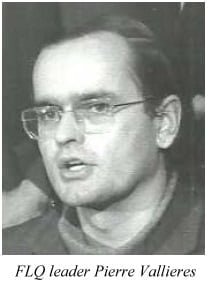
Many of the resources utilized in this report are derived from a book written by a journalist called Pierre Vallières, L’exécution de Pierre Laporte, les dessous de operation Essai (Editions Quebec-Amériques, 1977). Beyond what he writes in this book, Pierre Vallières himself is an important clue in the true story behind the true top down agenda of the Synarchy, which organized the various intelligence organizations that effectively manufactured the October crisis.
Vallières was a major player in the events of October 1970. He came from the separatist left wing and was a leading member of the Front de Libération du Quebec (FLQ), the movement that was held responsible for the bomb attacks, and the kidnappings of British diplomat James Cross and Quebec’s Deputy Premier Pierre Laporte.
Vallières’ connection to the FLQ and his first-hand account of the events surrounding the October Crisis are only truly useful if we take into account what he leaves out. By intentionally omitting a series of important facts, Vallières deflects the reader of his book from acquiring a sense of causality in the same way that September 11 “inside job” reports may seem impressive in their knowledge of the mechanics of controlled demolitions, yet always leave out the role of the Saudi and British governments (through BAE Systems), among other governments, in sponsoring the operation.
It is for that reason that it is vital to take into consideration the higher dynamics that Vallières omits before exploring the important mechanics which Vallière’s work accurately portrays regarding the fallacy behind the official narrative surrounding the FLQ and the October Crisis. Thus, before proceeding, we must first look at a relationship between Pierre Vallières and a magazine called Cité Libre.
The Cité Libre-Vallières-Trudeau Connection
Cité Libre was an influential journal founded by none other than Pierre Elliot Trudeau and Gérard Pelletier while both young men were employed by the Ottawa Privy Council Office in 1951. Cité Libre served as an important organizing tool used to attract young leftist elites of Quebec around an existentialist “personalist” ideology and to undermine the Catholic regime of Maurice Duplessis and the Vatican influenced Union National party that ran Quebec from 1945-1960. In fact, Vallières even received the reins of Cité Libre directly from Trudeau in 1965, taking over Trudeau’s job as Editor-in-Chief. This freed up Trudeau to become a federal Member of Parliament under the newly re-organized Liberal Party banner. The Federal Liberal Party had, by that time, been purged of all C.D. Howe influences, and had become the chosen host which leading Fabians and Rhodes scholars chose to «permeate» to advance their agenda. It is noteworthy that Trudeau, Lalonde, Pitfield, Gagnon and Pelletier had been devoted CCF/NDP members before joining the Liberal Party between 1963-1965.
The Liberal Party was chosen due to the simple fact that the Fabian Society of Canada’s New Democratic Party, previously known as the Cooperative Commonwealth Federation, demonstrated itself incapable of gaining the political power necessary to realize its ambitions.

Within five years of this transfer of editorship of Cité Libre, Vallières would be credited with leading Quebec into a state of crisis, while his former colleague Pierre Trudeau (now Prime Minister) would capitalize on the chaos of Vallière’s organization to implement the greatest psychological trauma on the Quebec population in history by declaring Martial Law. The invocation and subsequent use of this act also served to break the will of many Gaullist forces who were still resisting technocratic, Fabian reforms as late as 1970.
Several other Cité Libre operatives rose to prominence in Quebec or Federal politics leading up to or after the October crisis. These include René Levésques, founder of the Parti Quebecois, as well as Gérard Pelletier, Jean-Louis Gagnon, Marc Lalonde, Jean Marchand and Jean-Pierre Goyer.
Jean-Pierre Goyer was a frequent contributor to Cité Libre, becoming an MP alongside Trudeau, Marchand and Pelletier in 1965. He then became appointed Solicitor General by Trudeau, overseeing the entire RCMP during the October Crisis. After the RCMP became too scandal-ridden to be of any use, having been caught creating FLQ cells, robbing dynamite, conducting extortion and theft throughout the 1970s, Goyer played an instrumental role in creating CSIS, Canada’s intelligence service, alongside Trudeau`s right hand man and Privy Council Clerk Michael Pitfield in 1984. Pitfield himself had been active with the Cité Libre nest in the early 1960s, having translated the group’s influential “Manifesto pour une politique fonctionelle” in April 1964.

Jean-Louis Gagnon not only served as Managing editor of La Presse (alongside Gérald Pelletier), but also as Deputy Cabinet Minister and then head of Information Canada under Trudeau during the October Crisis. Meanwhile, Gérard Pelletier was appointed Pierre Trudeau’s Secretary of State. The Oxford-trained Marc Lalonde became Principal Secretary to Trudeau (and later his Justice Minister) and Jean Marchand (who was dubbed by the Quebec press as one of the “Three Doves”, with Pelletier and Trudeau being the other two) also became a Cabinet minister during this period.
This is the same group that later brought in a cybernetics overhaul to the Canadian government as well as the Malthusian Canadian branch of the Club of Rome, whose sponsorship by the Privy Council under Trudeau, Pitfield and Lalonde directed Canadian government funds to the organization that was used to produce the study that came to be called Limits to Growth (published in 1972). It was this fraudulent work that became the gospel of the neo-Malthusian revival and was used to justify the post industrial paradigm of depopulation, and globalism. This can be seen in the ties of Limits to Growth to founding of the World Economic Forum in the early 1970s.
The October Crisis of 1970: A Carefully-Prepared Plot
The list of structures and institutions that follows shows that some official circles had anticipated the October 1970 crisis. This, among other facts to be explored shortly in this article, implies that this crisis had been concocted to lead into the War Measures Act and allow for the invocation of the Emergency Measures Act. These two pieces of legislation would then be used to consolidate power in the hands of the “new technocratic elite” that had taken control of the Quiet Revolution following the mysterious death of Quebec Premier Daniel Johnson on September 26, 1968 and the ouster of both Jean Lesage and Charles de Gaulle from political power in 1969.
The purpose of the following timeline, which relies heavily upon accounts by Pierre Vallières, taken from his 1977 book L’exécution de Pierre Laporte, les dessous de operation Essai (Editions Quebec-Amériques, 1977), is not intended to establish the cause of the October Crisis, but instead to sufficiently demonstrate that the official narrative commonly used to explain this period cannot be true. Not only that, but as the facts show, the cause of these terrible events appear to have been organized by more powerful institutions both within and above the Canadian government.
At the Federal Level (Ottawa)
- Based in Ottawa, the Strategic Operations Centre (SOC), was the channel from the army to the Trudeau Government. Its existence became publicly known only in 1975, like that of the Centre national de planification des mesures d’urgences (CNPMU), that worked closely alongside the SOC. In the light of what we now know, one can well imagine that the tasks of those centres was to draft, and implement, scenarios that could lead to promulgating the War Measures Act via a “problem-reaction-solution” paradigm.
- Establishment of the Comité du 7 May 1970: set up by the Federal Government in the wake of the elections on April 29th 1970, as we shall shortly see. The decision was disclosed only on December 23rd 1971, by the Toronto daily The Globe and Mail.
In Quebec
- Opération Essai (Operation Trial), derived from an initial plan, first drafted in 1960, by the Planning and Operations Section of the Quebec Command. That same year, 1960, Jean Lesage became head of the Quebec Government, and launched the “Quiet Revolution,” which was a process that had a bipolar character. This process became a key battleground between two opposing forces. The first had aimed to install a technocratic elite in Quebec while secularizing the province. The opposing force was represented by those nation-building, largely Catholic forces then centered around Lesage and Daniel Johnson who desired to direct the revolutionary energy then enveloping Quebec around an anti-imperialist strategy of republicanism and technological progress.
- 1966: the Infantry, Air Force and Navy were regrouped, and a new Mobile Army Command was set up at the Federal Military Base of Saint-Hubert.
- 1969: the Mobile Army Command set up its Civil Emergencies Section, whereby contacts with the army were to be restricted to carefully selected political figures.
- 7 June 1970: Michel Côté, the City of Montreal’s Head of Litigation, was secretly appointed to head the Combined Anti-terror Team – Escouade combinée anti-terroriste or CAT. His job was to keep an eye on Jean Drapeau, then Mayor of Montreal.
Chronology of the October 1970 crisis
The chronology below also challenges the official thesis, and highlights a great many contradictions.
- 1966: Daniel Johnson is elected Quebec Premier, giving anti-Malthusian forces a new opening to regain their lost power on the continent. This coincides with the rise of Robert F. Kennedy to greater prominence in preparation for his 1968 announcement of his plans to revive his brother’s policies in his bid for the Presidency of the USA.
- 1967: Charles de Gaulle visits Quebec on Johnson’s invitation. Deals are struck between the two leaders based on advanced technology, infrastructure, space technology and cultural programs. Many components of this arrangement were based upon the French-Quebec assistance of technology and training to former African colonies now gaining their independence. The French President was invited to return at the end of 1968 for the Francophone Summit.
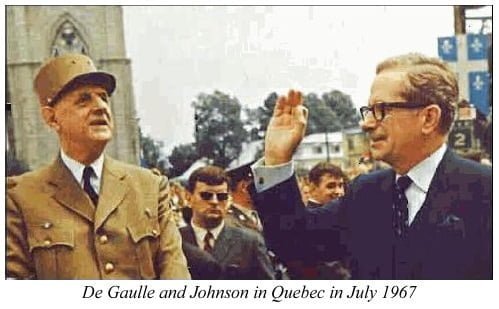
- 26th September 1968: Daniel Johnson dies under unusual circumstances, mere hours before the unveiling ceremony of the Manicouagan-5 Dam. Johnson had put that project into motion a decade earlier alongside then Premier and nation builder Paul Sauvé. Officially, he suffered a fatal heart attack, although no autopsy was ever conducted on the body.
- By 1969, Charles de Gaulle is forced out of office in an anarchistic mock referendum in France. De Gaulle himself had survived over 30 assassination attempts, several of which were orchestrated by the Montreal-based Permindex, which was also at the center of the assassination of President Kennedy in 1963. Two of the three previous Union National Premiers before Johnson met identical fates and died of heart attacks while in office in a period of 6 months. Maurice Duplessis died on September 7, 1959, while Paul Sauvé died on January 2, 1960.

- 1968: Daniel Johnson’s two greatest political enemies: Pierre Trudeau and Rene Lévesques, both agents of the technocratic reforms of the Quiet Revolution steered by Georges Henri Lévesque’s Université Laval, are set up to polarize Canada between two false notions of nationalism and install a new form of Malthusian power structure at both the provincial and federal levels. Trudeau becomes Prime Minister and Lévesques founds the Parti Quebecois (two weeks after Johnson’s death) and later emerges as Premier of Quebec (1976-85). The PQ absorbs many of the saner independence forces who advocated Johnson’s formulation of “Independence if necessary, but not necessarily independence”.
- 1968-1970: violent demonstrations break out in Montreal.
- The Civil Emergencies Section predicts “grave disturbances” during the April elections, and states that the army might have to be called out to “protect the democratic vote.”
- April 29th 1970: Provincial elections held whereby the separatists win 23% of the vote.
- February and June 1970: two kidnapping plots are uncovered by the Montreal police force (police de la Communauté urbaine de Montreal, CUM). One plot, to be launched in June 1970, was to be an FLQ attack on the US Consulate, launched by FLQers Lanctôt and Marcil.
- 27 May 1970: an article appears in La Presse, on the army’s role in putting down civil disturbances in Canada. According to the article, military operations were be run out of the Saint-Hubert base.
In Pierre Vallières’ view:
“By late summer 1970, everything was in place, and liaison between the army and the police forces concerned had moved onto a weekly, sometimes daily basis.” He adds that “By June, the contents of the October manifesto had already been printed in some newspapers, following the abortive ‘Lanctôt-Marcil’ plot against the US Consulate; the FLQers demands had become known, and, finally, the FLQ’s operational bases (save for the flat rented in September in Northern Montreal by Cossette-Trudel) had been dismantled or had become known to the police. The FLQ-1970 was under control in October, and no surprise was possible.”
James Cross is kidnapped
- 5th October 1970: The British diplomat James Cross is kidnapped. The police’s first step is to go straight to the wrong place, the Greek Consul’s place of residence. The kidnappers’ trace is lost. The kidnappers demand that the FLQ’s manifesto be published, and that their political prisoners be freed.
- 7th October: One o’clock in the afternoon. Mrs. Cross is shown police photographs and identifies Jacques Lanctôt as one of the kidnappers.
- 8th October: The FLQ manifesto is published, but negotiations continue over the freeing of political prisoners.
Pierre Laporte is kidnapped: the crisis intensifies
- 10th October (5:40 pm): the Quebec Justice Minister announces that the authorities have decided to categorically reject the demands made by Cross’ kidnappers, nor will they free the political prisoners.
- 10th October (6:18 pm): Pierre Laporte, Vice-Premier of Quebec and Minister of Labour and Immigration, is kidnapped in front of his home, just as he was about to play ball with his nephew. Pierre Laporte was second in command of the Quebec Government, and as such, was, allegedly, afforded special police protection. However, the first thing the police did – having been notified of the kidnapping within two minutes of the event – was, yet again, to go straight to the wrong place!
- Vallière reports that: “the six eyewitnesses of the kidnapping of Pierre Laporte (his nephew, his wife and their neighbours) are unanimous: the kidnappers were ‘clean cut’ and well dressed, a fact sergeant Desjardins confirmed to journalists that evening (…) Another witness, who worked in a petrol station on Taschereau boulevard, stated that shortly before the Minister was kidnapped, strangers had asked him how to get to rue Robitaille. ‘I thought they were policemen’, he said, because one was carrying something that looked like a walkie-talkie’.”
- Night of October 12th to 13th: The Army Mobile Command sends an emissary to Quebec’s Justice Minister, Jérôme Choquette, demanding he sign, in the name of the Bourassa cabinet, a letter requiring intervention by the armed forces. The cabinet was not then prepared to sign, and Choquette announces he would continue his efforts to persuade the reluctant elements.
- 15th-17th October: “For appearances’ sake” the Canadian Parliament debates the opportunity of proclaiming the War Measures Act. The Opposition puts up a show of protest until Saturday October 17th. Pierre Laporte’s body is thereupon discovered, “proving” a posteriori that the measures unleashed on October 16th had been needful.
- 15th October (2 pm): The Canadian army begins to deploy in Quebec, at Bourassa’s request.
- 15th October (9 pm): Bourassa ups the ante, and lays down a six-hour deadline for the kidnappers to hand over James Cross and Pierre Laporte.
- 16th October (in the night): Quebec Premier Bourassa signs a letter written by Federal Justice Minister Marc Lalonde, instituting the War Measures Act. Several thousand soldiers were already deployed in the streets of Quebec and in the Federal Capital Ottawa. Through the War Measures Act – whose application need not be voted upon by Parliament and that has NEVER been abrogated since – the curfew came down, civil liberties were suspended, and, inter alia, search of private domicile without warrant became lawful. Over four hundred people were arrested.
- 16th October (4 am): Meeting in Council, the Governor General, the Queen’s direct representative in Canada, approves the proclamation of a state of emergency, pursuant to which the War Measures Act comes into force automatically.
- 17th October (4 pm): a member of the Cell that calls itself “Dieppe (Royal 22°)” (this is the name of a French Canadian regiment but that was not, oddly enough, at Dieppe in WWII, where many French Canadians died) calls into the CKAC radio station. Purportedly, this is a third and heretofore unknown FLQ cell. The caller announces that Pierre Laporte has been murdered. The earlier communiqués had all come from the FLQ cell known as Libération, that held James Cross, and that spoke on behalf of the Chenier Cell, the members of which were presumed to be the Pierre Laporte’s kidnappers. The Libération cell, that seemed to find the “Dieppe (Royal 22°)” business disturbing, put out a communiqué at mid-day, calling upon the press to blow the whistle on a “montage” (coup monté) by the Federal Government. The police prevented that communiqué from being published until December 8th.
- Pierre Laporte’s body is found in the boot of the very car used to kidnap him (witnesses had taken down the car’s registration number at the time) later in the evening on the Saint-Hubert military base (!), right next to the Army Mobile Command. Given the prevailing State of Emergency, who, I ask, could have driven the car onto the base without being stopped and searched? Credibility is stretched well beyond the breaking point here.

- In the hours following on the death of Pierre Laporte, the authorities put out a description of Paul Rose and Marc Carbonneau, but not that of Jacques Rose, Francis Simard or Bernard Lortie. Paul Rose, Jacques Rose and Francis Simard (presumed to be members alongside Bernard Lortie of the Chénier cell, while Marc Carbonneau and Jacques Lanctôt were part of the Libération cell holding James Cross) had been on police files and monitored since no later than 1968. The three had been in Texas (or perhaps Mexico) since September 1970, and had raced back to Quebec after James Cross was kidnapped. The many trips by Chénier cell members during the time Pierre Laporte was held (and the temporary gaoling of Jacques Rose and Francis Simard between October 15th and 17th) lead one to presume that it could only have been someone quite different keeping watch over the Minister, and that the actual role played by the cell in kidnapping and murdering him was secondary.
- 19th October: The house where Pierre Laporte was held and murdered, or so goes the official thesis, is “discovered” at 5630 rue Armstrong at Saint-Hubert, near the aforesaid military base bearing that name. That very house had been ransacked by police whilst the Minister might have been there, but nothing was turned up. Bourassa told Mrs. Laporte on 14th October that the police had found the place her husband was being held: “he will be freed within hours, we await the opportunity to do so without endangering [him].” The question remains: was that safehouse 5630 rue Armstrong?
- 2nd November: The Federal Justice Minister John Turner proposes an Emergency Measures Bill, based on the War Measures Act. The Emergency Measures Act was voted up on December 1st and came into force for five months.
- 3rd December: The Emergency Measures Act is signed into law. The crisis was, at least apparently, over. Why the sudden need for new Emergency Measures?
On that very day, December 3rd, James Cross is freed, and his kidnappers in the Libération cell are given safe passage to Cuba.
- Late December: Paul and Jacques Rose, as well as Francis Simard are arrested. The coroner’s report is based upon unsigned confessions. Paul Rose never acknowledges, not even verbally, the confession attributed to him. Although he was actually firmly in police custody at the time, and apparently to avoid any risk whatsoever that he spill the beans in open Court, he was, unbelievably, tried in absentia!
- 31st March 1971: Paul Rose, Bernard Lortie and Francis Simard are sentenced to life imprisonment. Jacques Rose, who was tried later, was acquitted. The Prosecution Service declines to appeal. Jacques Lancôt and Marc Carbonneau were already in exile in Cuba.
If we are to go by the explicit terms of the War Measures Act, the entire country was about to go down in murder and mayhem. The truth is rather different: the FLQ was a tiny, two-cell organisation with a total membership of about ten! But we read, in Article 2 of the War Measures Act:
“EVIDENCE OF WAR
The issue of a proclamation by Her Majesty, or under the authority of the Governor in Council shall be conclusive evidence that war, invasion, or insurrection, real or apprehended exists and has existed for any period of time therein stated, and of its continuance, until by the issue of a further proclamation it is declared that the war, invasion or insurrection no longer exists.”
Until 1970, the War Measures Act, first promulgated in 1914, had been proclaimed only twice before: when Canada entered the World War I, in 1914, and World War II, in 1939. Here, we are to take the Governor General’s personal opinion, as “conclusive evidence” of a State of War that absolutely did not exist.
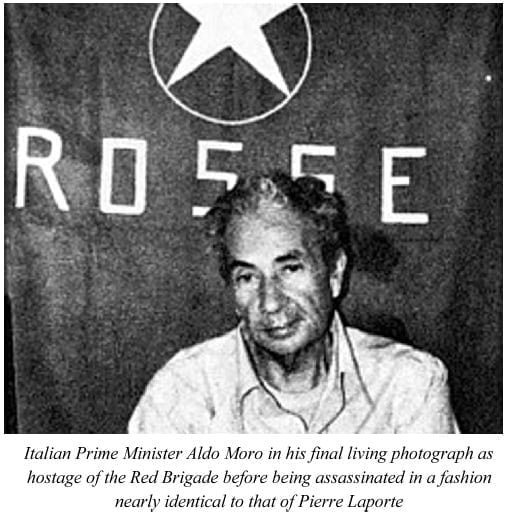
What did the victim himself think about all this? All that is known for certain, is that in not one single letter he wrote to Premier Robert Bourassa while kidnapped did Pierre Laporte ever refer to the FLQ, nor did his wife, or most of his friends, ever buy the official story. A Royal Mounted Canadian Police (RCMP) report dated March 3rd 1971 states that Mrs. Laporte’s opinion was that the authorities had executed her husband.
There is a dreadful similarity between the Laporte kidnapping and murder, and that of former Italian Prime Minister Aldo Moro in 1978, down to the detail of the police wandering about in circles in the vicinity of the safehouse. In both cases, subsequent events strongly suggest that the real intention was never to free the kidnapped victim, but to use the crisis to shift the balance of power in the country, in favour of rentier-finance interests.
The Material Ease of Terrorists
It is rather astonishing that so many players from that time have since risen to positions of material ease and social prominence. Precisely at the time of the October Crisis, the synarchy has launched a fresh wave of “strategy of tension” in Europe and the Americas. Throughout the 1980s to the present, the true orchestrators of the events of October 1970 have wished to keep a tight grip on the players used during that game, likely to prevent their disclosing what really went on.
Ex-FLQer Jacques Lanctôt now owns his own publishing house, with a large stock-in-trade on cultural, sociological and psychological issues, and essays on the separatist movement. On March 28th 2004, Télé-Quebec broadcast a documentary called Hostage (Otage), comprised of interviews with Jacques Lanctôt, who kidnapped James Cross, and the Cross family. The documentary was finished in early 2004. Lanctôt is now a leading journalist with Canoe Inc., which is owned by Quebecor (whose Vice-Chairman is none other than Brian Mulroney).
From 1996 to 2002, Paul Rose had achieved such a miraculous boost of success that he became the head of the Quebec wing of the New Democratic Party of Quebec! Yes, this is the same NDP which grew directly out of The Fabian Society of Canada’s Cooperative Commonwealth Federation.
Under Rose’s lead, the Quebec NDP merged with the Union des Forces Progressistes which in turn merged with two other organizations to become Quebec Solidaire which currently holds 10 seats in Quebec’s National Assembly. On March 14, 2013 Quebec Solidaire spokesman MP Amir Khadir introduced a resolution into the National Assembly to honour Paul Rose.
CSIS’s ‘Trudeau Files’ Erased in 1989
On June 15, 2019 the strange fact was made public by Canada’s National Post that the entire 40 year CSIS/RCMP dossier compiled on Canada’s most famous Prime Minister, Pierre Elliot Trudeau, was destroyed by Canada’s top spy agency in 1989.
How this embarrassing fact could have gone unnoticed for so long is surprising given Canada’s access to information laws, which make all government dossiers available on any public or private citizen 20 years after their deaths. In 2019, historians searching for a story filed early applications to read this long-awaited dossier, which was supposed to be awaiting scrutinizing eyes in the Archives of Canada. The answer they received from CSIS and the National Archives was that the massive treasure trove of documentation was destroyed because it supposedly did not “meet the threshold set out by the CSIS Act to justify being kept in service’s active inventory. The file also fell short of criteria for preservation set out by the national archives.”
Based upon the facts laid bare in the above text and earlier in this report, it can safely be said that the true reason for CSIS’s destruction of the Trudeau Files was likely related to it detailing devastating information on the role played by Canada’s third longest standing Prime Minister within the context of Britain’s geopolitical “Great Game” against the world.
The role his son is now playing in carrying out the authoritarian legacy begun by his father 50 years ago can only be understood from this vantage point.
Learning History’s Lessons

Today’s situation in Canada obviously has many parallels to the events that occurred in 1970. An abused population has been pushed to its limits by a sociopathic power elite and this population is standing up for such basic rights as life and liberty. The psychology of the oligarchical social engineers attempting to manage the behavioral transformation of Canadians (and the world) into a complacent docile herd of cattle has also not changed over these 50 years.
While many of the particular managers of the empire have come and gone over the decades, the principled conditions of the fight between two opposing views of humankind still endure. Where one view is represented by those who believe in the inalienable rights of every individual, the other view is today represented by transhumanist (i.e. neo-eugenicist) technocrats who demand submission and assimilation into the only permitted reality by all citizens and nations.
It remains to be seen whether those standing up for the basic liberties among the freedom convoys both in Canada, and increasingly abroad, are capable of navigating through the storm and traps being set by those same intelligence agencies that stage managed the events of 1970. Ultimately, their success is contingent on whether the lessons of history are internalized as quickly as possible.
Just as it was 50 years ago, today’s generation of sociopathic technocrats and the oligarchical hivemind they represent suffer from one powerful Achilles heel. That is, they believe their own propaganda and genuinely see themselves as the God-like immortals who are divinely ordained to sit above the slavish depopulated and dumbed down mortals forever, much as Aeschylus’ depicted the character of Zeus in his famous play Prometheus Bound.
It is that hubris and arrogance which also ensures a religious-like inflexibility to bend to a higher truth when it is demonstrably presented in the systems they wish to control. Instead, this parasitical oligarchical culture will always be guaranteed to use the qualitatively same methods and modus operandi decade after decade without any capacity to self-criticize their own fundamental operating system despite its flawed and disprovable axioms. Dirty tricks will be used, false flags deployed to lay blame on the innocent, false protest groups will be created to attract well intended fools, and division and discord will be sown wherever possible. And where those techniques fail, the oligarchy’s true colors will be forced out of the shadows and the face of evil which despises the light of truth will continuously be forced into the spotlight.
So long as humans committed to their humanity continue to mobilize in love, peace and wisdom for their inalienable rights despite the threats posed to our individual security or even mortal existences, then this natural expression of true civilization will spread like a Promethean fire in non-linear ways that no mathematical model or technocratic control freak will ever be able to control.
